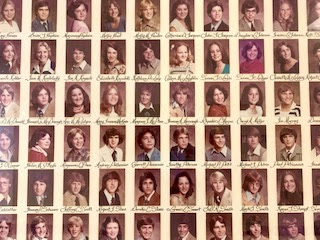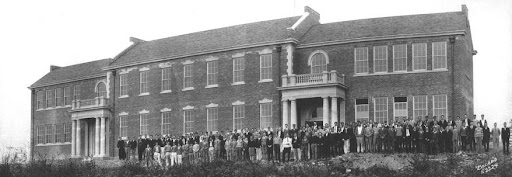Veteran teachers look back and move forward

Some of these teachers were even teaching this group of grads.

As Bellarmine enters a new, post pandemic world, veteran Bellarmine staff who have been teaching at the school for a long time give insight into Bellarmine’s past. Through the years, many teachers look back at the memories made and reflect on their experience teaching at Bellarmine. Many of them express that the heart of teaching is in relationships.
Bill Baerg, who has been teaching at Bellarmine for 25 years said, “I just love teaching and seeing kids grow as they make their four-year journey through Bellarmine.”
Recently retired Bill Eckert, who started working at Bellarmine in 1987, also reminisces on his “last formation period, the seniors who graduated a few years ago. So many great memories with them.” Eckert not only formed relationships with students, but also appreciates his career at Bellarmine for other reasons. “My wife was working over with the administration, and we met here and got married in the chapel.”
Beyond relationships with students and colleagues that have come and gone, long time teachers and staff share a mutual appreciation for memories they have shared over the years from their time at Bellarmine. Rick Barnhart, science teacher of 37 years, said, “There used to be a giant party for Oktoberfest here on campus and a big bonfire in the parking lot for homecoming.”
Talking to teachers can provide a plethora of ideas from past years, such as these, that could potentially be revamped into fun, fresh activities for current students to enjoy, creating a more exciting student culture.
Jenny Phillips, science teacher of 31 years, said, “I miss having big crowds at events to support students. You couldn’t get a ticket to the musical because it was sold out every night. Not just football, there were crowds at the volleyball games, crowds at the soccer games. People would come watch the home cross country meet. I don’t see that support in the same way because of students connecting digitally.”
Perspectives like this remind what really matters at the Bellarmine community. This is what life at the school is all about. Speaking of community, Phillips also said, “I’m always in awe of all school masses when the entire school body is prayerful. I find this community very supportive of each other.”
While kids and staff come and go, the heart of Bellarmine never changes. It is a school of faith, excellence, and creativity. Ron Nilsen has found his 48 years teaching science so rewarding because of this. He says, “This has been a wonderful place to work for me because they have allowed me to be creative. They let me build the Marine Chem program and Capstone program. They didn’t contain me… A collective fondness, whether it be watching kids play sports or going to the play, is what makes the school special.”
Rick Keller-Scholz also reflects on how he was able to explore passions during his teaching career at Bellarmine; “I used to do costumes for the theater, and to see students shine in different ways and see how gifted they are was a real humbling, cool experience.” From the football field to the test tube to the stage, Bellarmine teachers have found special places within the school to share their passions and talents and curiosities with students.
Keller-Scholz said, “We’ve become much more diverse. Seeing people from many socioeconomic and heritage experiences which weren’t there 40 years ago.”
Nilsen also said, “When I came 48 years ago, it was a small, Irish, Catholic high school. Society changed, which I’m glad to see. It became more open to include kids who weren’t Catholic, you could be Baptist, Lutheran, or even questioning. That wasn’t always here.” From the perspective of those who have been at the school for many years, Bellarmine has made changes as society has changed, becoming more accepting of other genders, ethnicities, and even religions. This open environment has created a space of exploration and discussion, creating a strength of mixed global perspectives.
Changes in demographics have brought changes in how students are treated and handled. Keller-Scholz says, “JUG used to be used in a much more punitive way, and I’m glad we’ve moved away from that. We used to have Saturday JUG from 8-noon. I don’t think that helps people in the long run with their struggles.” (With the recent reinstatement of Saturday JUG, students and teachers alike hope that it will be handled differently for current students.)
Nilsen, chuckling, said, “in the early years, if kids didn’t behave, they would ‘hack’ em. Once the girls came, they thought ‘eh, probably shouldn’t spank girls.’ It was like the old guard retired, and issues were more complicated.” Bellarmine has moved away from primitive punishment to other forms of self improvement through the addition of counselors, the academic resource center, and more. As a college prep school, Bellarmine has come a long way in trusting their students to make appropriate choices for their future.
Bellarmine has also moved passed some interesting, possibly questionable, traditions. Barnhart says he doesn’t miss “‘snaking’ kids, when they would take freshmen and throw them in Snake Lake, and the senior smokehouse.”
It goes without mentioning, many teachers have experienced much change with the campus itself.
Science teacher Anita Emery said, “I was on the committee that helped design Snyder Hall. Designing and making choices and being in this wonderful facility was very exciting.”
Before all the physical changes, Phillips said, “Snyder was only half the size. The campus center was a different building. Weber hall wasn’t built. The old gym was here instead of the new gym. I taught in a portable. The courtyard was a parking lot.”
Technology has been the most impactful change Bellarmine has seen. Nilsen said, “technology has reduced so much of the paperwork. We used to have briefcases full of paperwork. It is so much easier now. I can go to Showbie and click and put it in put the gradebook. It isn’t as tedious as it used to be in the old days.”
However, some teachers miss the simplicity of education without technology. Keller-Scholz says, “When I started teaching here back in 1981, we all used chalkboards, and I still miss the ‘messiness’ of chalk on a chalkboard and the feeling of it in my hands.” All in all, from the iPads to Moodle to email to the announcements over the loudspeaker, technology has drastically changed the way teachers and students operate.
Veteran teachers have witnessed impactful moments during their career, and even somber moments as well. As we reflect on the 9/11 attacks this month, Phillips recalls that day many years ago. She said, “We had a memorial mass on 9/11 a year after the attack. We were asked to process silently out to the courtyard. I thought ‘this will never work, they’ll be jostling and talking,’ but they were dead silent. It was so respectful and people took it so seriously and I was impressed with their level of reverence… The day of the attack, I was teaching seniors, and they were worried and wanted to know if they would be drafted into the military.” Moments like this shape a generation, and remind students and faculty today of the history they share with past students, friends, and family. Through the vivid memories of those who experienced this event, its memory can live on, reminding the Bellarmine community what our country has endured.
Another pillar of school, religion, has evolved over time. As the school has moved through a new century, teachers, reflecting on years past, have seen a change in the practice of religion. Keller-Scholz says, “religion has gotten more challenging for people. Some families just have a different experience growing up where God is talked about but not as much organized religion. This has presented a really beautiful challenge for people to talk about basic things and show how God really loves people. I think maybe because people are less connected than they were 40 years ago.”
Eckert also admits there are “fewer Jesuits working on campus, now more lay people who are working as teachers, campus ministers, and coaches… The one thing that hasn’t changed since I’ve been here is Father J/Gerry.” While religion continues to shift for different generations, looking back on past practices and cultural norms reveal how much Bellarmine, and the world, have changed. This is an opportunity for Bellarmine to reflect, with gratitude, on the unique religious resources still offered on this protected hill that are not as commonplace anymore.
Teachers who have taught at Bellarmine for many years offer a unique and wise perspective on the school. After years of building relationships with colleagues and students, Eckert says, “I don’t miss having to say goodbye to 200 kids a year. Some of them come back, but a lot of them, we just trust in God they are out in the world doing good things.” Veteran teachers have seen the highs and lows, know what has worked and failed, and are bursting with knowledge and wisdom to share to the student body. As the school moves on and makes decisions, looking towards those who have been here through it all, why don’t students and staff members rely on this powerful resource more often?

Allie is a senior this year who is very excited to be part of the Journalism staff. At school, she is a Sustainability representative and Link Crew Core...
